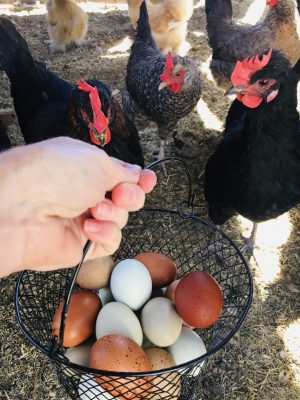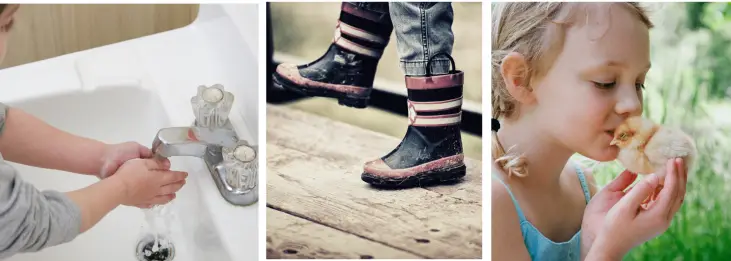
In order to keep kids safe around chickens it is important to have a set of “chicken coop rules” for everyone to follow. These rules should include monitoring young children around chickens as well as encouraging proper chicken coop hygiene to help prevent the spreading of diseases.
1. Teach Children the Importance of Hand Washing

Hand washing is one of the most important safety precautions that both adults and children should take when not only handling chickens, but even just being around the chicken coop. This includes both before and after holding chickens, collecting eggs and doing any chores around the chicken house.
When I teach children to wash their hands, I tell them to sing the alphabet 2 times while they are rubbing the soap all around their hands. I teach them to get soap on the front, back, all around and in between their fingers! According to the CDC, it takes about 20 seconds of hand washing with soapy water to kill most germs.
Get kids (and yourself for that matter) into the habit of washing your hands both before and after handling anything to do with the chickens. Chicken coop tools, such as shovels and rakes can carry invisible bacteria that cause illnesses. This can easily be transmitted to humans by touching the face or eyes.
For more information on how cleaning the chicken coop can make you sick, read my article Can Cleaning a Chicken Coop Make You Sick? (9 Tips).

What Diseases Can a Child Get from Chickens?
Salmonella and E. coli. are the most common diseases passed from chickens to children. Very young children, ages 1-5 years of age, are more at risk of developing these diseases because their immune systems are more immature.
Strict hand washing and keeping hands away from the face can drastically reduce the spreading of these harmful diseases.
Children, even more so than adults, are prone to putting their fingers into their mouth or rubbing their eyes. Couple this with a chicken with a hidden illness and that disease is easily transmitted to a child.
| DISEASE | HOW TRANSMITTED | HUMAN SYMPTOMS |
|---|---|---|
| SALMONELLA (BACTERIAL) | MANURE, UNDERCOOKED EGGS AND CHICKEN | DIARRHEA, VOMITTING, FEVER, ABDOMINAL CRAMPING |
| CAMPYLOBACTER (BACTERIAL) | MANURE, UNDERCOOKED EGGS AND CHICKEN INHALING MANURE PARTICLES | DIARRHEA, VOMITTING, FEVER, ABDOMINAL CRAMPING |
| HISTOPLASMOSIS (FUNGAL) | INHALING MANURE PARTICLES | COUGH, SHORTNESS OF BREATH |
| AVIAN INFLUENZA- BIRD FLU, (VIRAL) | SALIVA, MANURE, NASAL SECRETIONS, INHALING MANURE PARTICLES | FLU-LIKE SYMPTOMS, PINK EYE, ABDOMINAL CRAMPING |
| EXOTIC NEWCASTLE DISEASE (VIRAL) | DROPPINGS, RESPIRATORY SECRETIONS, INHALING MANURE PARTICLES | MILD FLU-LIKE SYMPTOMS, MILD EYE INFECTIONS |
| E. COLI (BACTERIAL) | UNDERCOOKED FOOD, DROPPINGS | DIARRHEA, VOMITTING, FEVER, ABDOMINAL CRAMPING |
2. Always Monitor Young Children Around Chickens
Monitoring kids around chickens is important for both a child’s well-being and chicken’s. A young child does not know his own strength and can easily injure a baby chick or chicken. A young child can get seriously hurt if attacked by a rooster or poked in the eye by a curious hen.
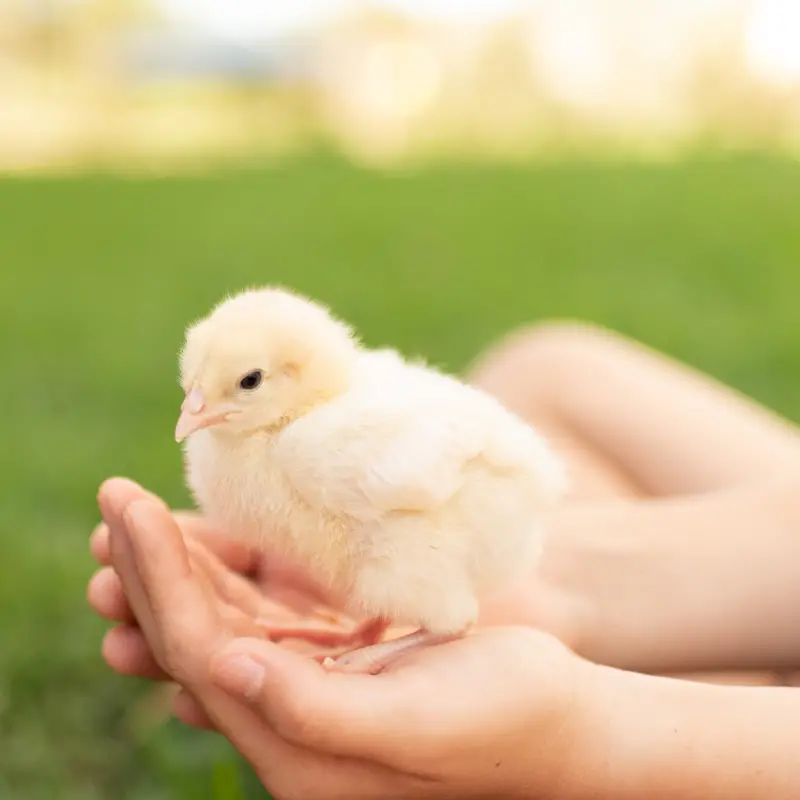
AGES 1-4 YEARS OLD: This age group should be constantly monitored around chickens. At this age, most children do not know their own strength and can easily hurt a baby chick by dropping it, petting or squeezing it too hard.
Show Your Child the Proper Way to Hold a Chick
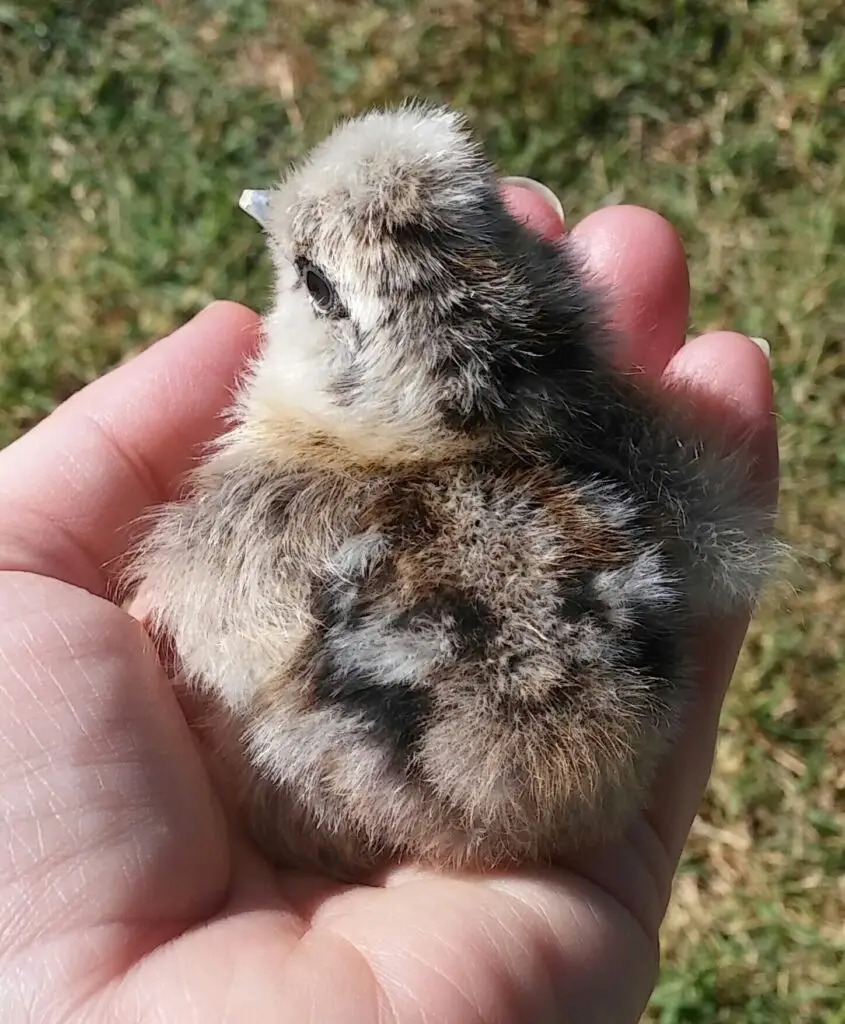
1.Sit on the grass next to your child. The idea is to be close to the ground or a soft surface should your child drop the chick.
2. Show your child how you gently hold the baby chick and how you gently pet it.
3. Have your child sit next to you on the grass and gently place the chick in his or her hands. Some kids get squirmy when they hold something new, so be alert to this and ready to take over. It may take a few tries before he or she is comfortable holding it.
4. You can take their fingers and show them how to gently pet the chick, telling them, “Gentle.”
5. Teach them to always sit down when holding a baby chick. Don’t let them walk around with chicks at this age. A chick can easily break a leg or even die if dropped at even a low height, if they land wrong.
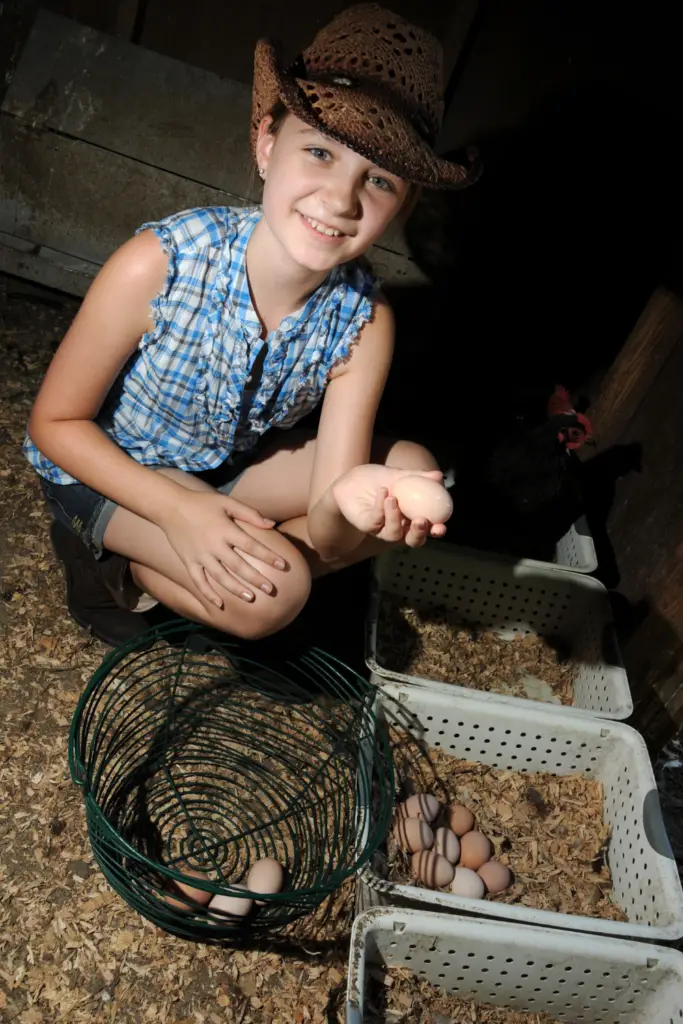
AGES 5-7 YEARS OLD: I have found it best when first introducing young children to baby chicks or chickens to always be there to observe. Once you feel they know and will follow the rules when handling and being around the chickens, they can be given more freedom.
As a parent, you are the best judge to know when your child is ready to be given more freedom. Give them more and more freedom and responsibilities with the chickens as time goes on.
At this age, most children do well at collecting eggs, washing the food and water bowls and even feeding the chickens. Always double check when you first give them more responsibilities. (Just in case they said they fed the chickens or replenished the water, but didn’t.)
3. Get Your Child a Pair of “Coop Boots”
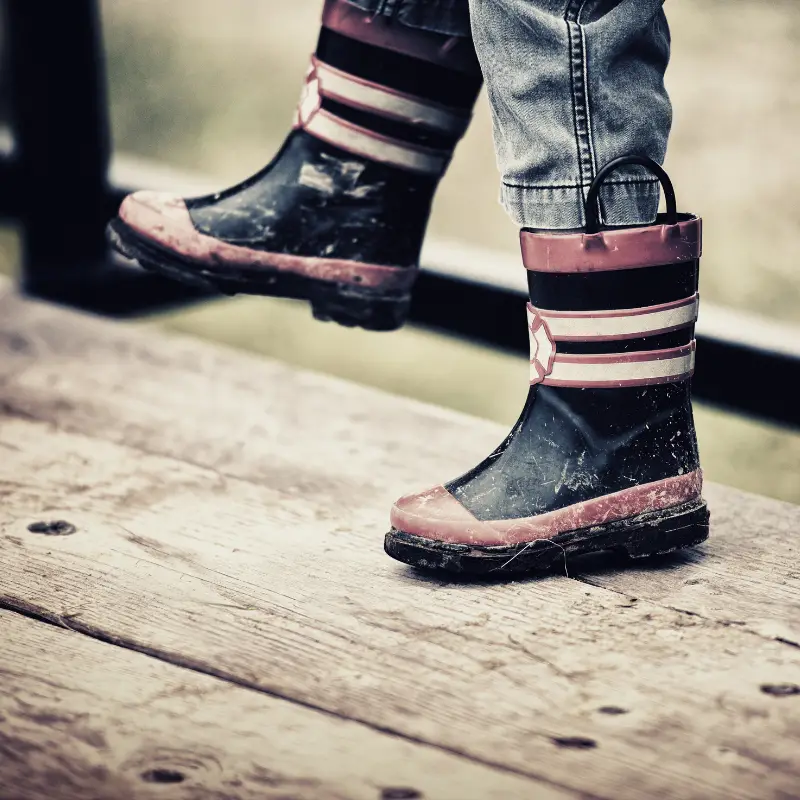
Chicken coop floors are covered in bacteria. I always find it best to keep a separate pair of “coop boots” not only for the children but for adults too. Leave them just outside the door to your house. Never wear them inside.
Even if you hose them down, they can still carry all kinds of bacteria that could easily be tracked on to the floor of your home. Bacteria is invisible and can simply be transferred from the floor to a crawling baby or even yourself if you sit on the floor.
Having a pair of boots for your child to wear only when around the chicken coop will help to decrease the chances of ou spreading bacteria around your property, including the house.
Most kids will feel special to be able to have their own coop boots. Give them some age appropriate chicken chores that they can help you with while wearing them.
I find it best to always observe your child when they are first performing new chicken chores. Give them more freedom when you feel they can do the chore without you there.
| CHICKEN CHORES |
|---|
| GATHERING EGGS |
| CHANGING BEDDING IN NESTING BOXES |
| FEEDING CHICKENS |
| GIVING FRESH WATER TO CHICKENS |
| CLEANING FEED AND WATER CONTAINERS |
| GIVING CHICKENS TREATS |
| TRIMMING WING FEATHERS |
| INSPECT CHICKENS FOR INJURIES |
| SHOVELING POOP |
| INSPECTING COOP FOR NEEDED REPAIRS |
| DEEP CLEANING CHICKEN COOP |
| MAKING SURE CHICKENS ARE IN AT NIGHT |
4. Teach Children Chickens Stay Outdoors
Chickens may look clean, but they walk in a chicken coop that is covered in feces. Sometimes when they poop, feces can stick to their feathers. And the dirt that chickens take a dust bath in is not really, “clean dirt.”
Salmonella is one of the most common chicken diseases and is very easily transmitted to humans. Children under the age of 5, adults over the age of 65 and immunocompromised people are at the most risk of contracting diseases from chickens.
Chickens actually prefer and thrive being outdoors, especially if they can free range!
It is important to allow your chickens to have daily access to sunlight. Sunlight is what makes them produce hormones which are required for egg production.
Chickens also need to be able to peck and scratch the ground. They instinctively do this, looking for food. They cannot do this indoors.
Dust baths are a must for a chicken to rid themselves of any parasites and to clean their feathers. Keeping a chicken indoors does not allow a chicken the ability to do this. Even if you did provide a chicken a place indoors to dust bathe, it would be very dusty and hazardous to breathe.
As tempting as it may be when I see my chickens peering inside my patio door, I make it a rule that chickens are not to come inside. This way, I can rest assured that my family is much less likely to be exposed to any illnesses that the chickens may be carrying.
5. Children Shouldn’t Kiss or Snuggle Chickens
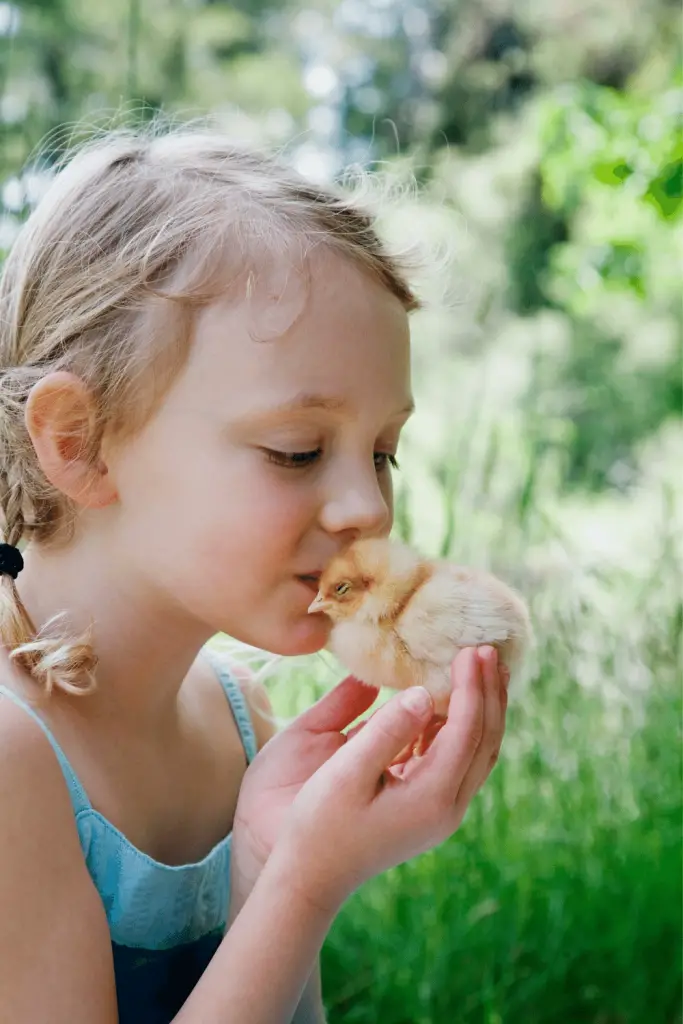
I know. How can you hold a baby chick and not want to snuggle or kiss it? It’s hard, but for the safety of your children and your whole family, you need to resist.
Salmonella and Bird Flu are two chicken illnesses that can be transmitted to humans through saliva. Allowing children to kiss and snuggle baby chicks or chickens will put them at a higher risk of getting sick.
What are Symptoms of Salmonella in Children?
Children that have been exposed to salmonella will typically start showing symptoms from 6 hours to 6 days after exposure. A child may complain of a “tummy ache,” have a fever and diarrhea. The most important thing for your child is getting enough fluids and rest.
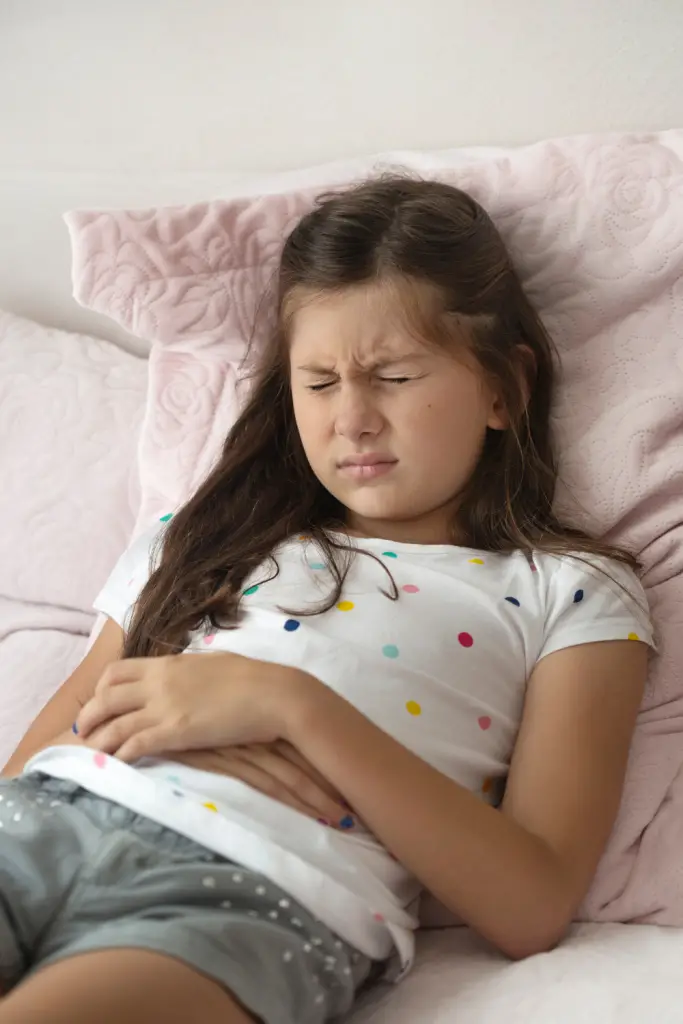
Some people it can take several weeks for them to develop symptoms, but this is not as common.
Keep your child well hydrated and make sure that they get enough rest. In severe cases, it may require hospitalization and IV fluids.
Even after a child feels better, salmonella bacteria can still be transmitted in a child’s stool for several weeks to months later. So take special precautions.
CONCLUSION: How to Keep Kids Safe Around Chickens
Knowing how to keep kids safe around chickens is important for both their health and safety.
1.Teach children the importance of hand washing to help stop the spread of chicken illnesses.
2. Always monitor your children around chickens. Show them the proper way of holding baby chicks and chickens. As they you feel they are ready, give them more and more freedom to do things on their own.
3. Get your child a pair of “coop boots,” that they are to wear only around the chicken coop.
4. Keep chickens outdoors.
5. Teach your children, no matter how difficult it is, don’t snuggle or kiss the chickens!
Raising chickens is such a joy and something that the whole family will benefit from in so many different ways! 7 Important Ways Families will Benefit by Raising Chickens

